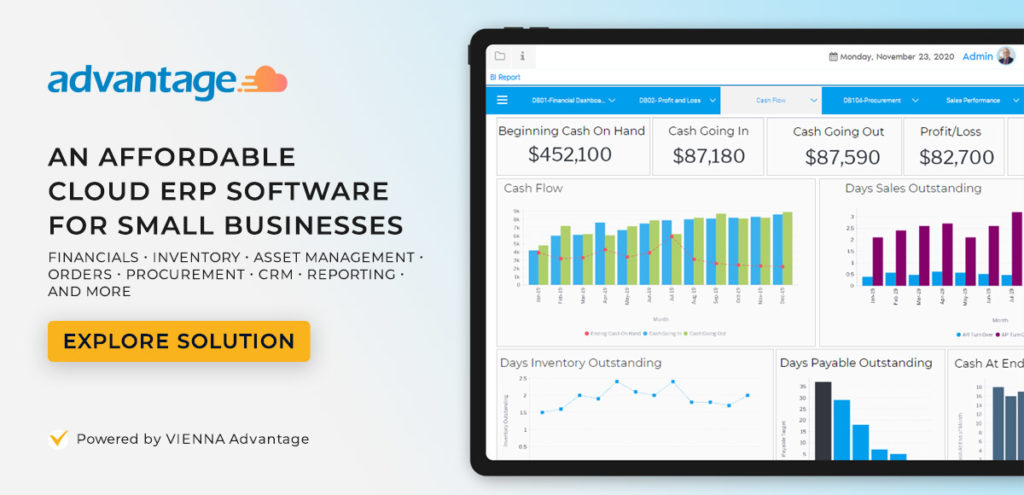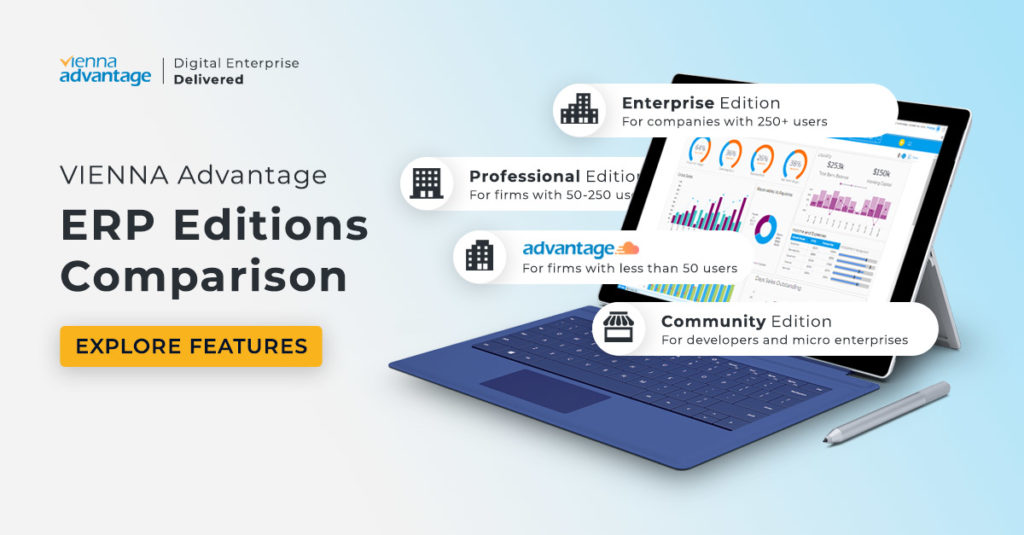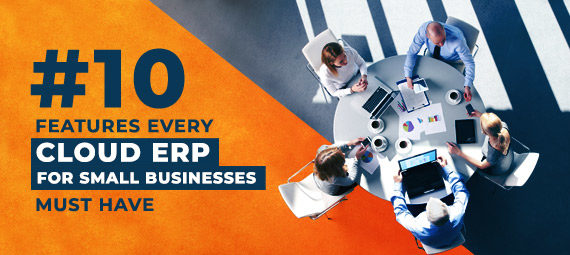Is Cloud ERP software the first choice for small businesses? No. Should it be? Yes! Why? Continue reading…
A typical small and medium business owner chooses a minimalistic approach to digitizing their business processes. Consequently, the typical IT landscape of such a business is centered around accounting software and a host of spreadsheet-based or isolated applications to manage everything else – from customer and product databases to recording sales and purchase orders.
Although such a setup looks appealing from a short-term cost perspective, small businesses must start to look for better alternatives that give them the ability to integrate various business processes within a single Cloud ERP application. In this article, we will examine the features such an integrated system must have and why it is crucial for small businesses to look for such an integrated system.
Below are the 10 features every Cloud ERP for small businesses must have:
- Product and Service Catalog
- Price List and Discounts
- CRM: Leads, Opportunities, and Customer Management
- Order Management
- Service Contracts
- Materials Management
- Project Systems
- Time & Expense Reporting
- Procurement
- Organization Management and Accounting
#1 Product and Service Catalog
Small and medium businesses deal with several products and services that they provide to their customers. For an integrated Cloud ERP for small businesses, the feature to define a flexible product and service catalog is very crucial. As such, a reliable Cloud ERP application would have the features for businesses to define Product and Services Categories and include several products and services respectively within those categories. When it comes to defining product features – the ability to define Products, Services, Resources, and Bills of Material or Kits is the foundation of running an integrated Cloud ERP for small businesses. Doing so will allow the business to record transactions consistently across departments.
#2 Price List and Discounts
With every product and service that the company offers, a suitable Cloud ERP solution should have the feature to maintain price lists and applicable discounts that the SME offers to its customers. This feature of the Cloud ERP application must allow for maintaining multiple versions of pricelists and discounts as applicable per customer segment or by geography. That way, every sales personnel has a unified view of the company’s pricing policy and will help in enforcing a company-wide consistency in pricing. Also, the Cloud ERP for small businesses must provide the ability for these pricelists to be dynamic in a way that they can be changed on the basis of prevailing business conditions.
#3 CRM: Leads, Opportunities, and Customer Management
Every business, regardless of its size has customers to serve and products and services to sell. Therefore a Cloud ERP for small businesses should provide all the necessary features to manage customer data and the entire sales process. This includes the features to create and manage various business partner groups and maintain links to related business partners (such as ship-to and sold-to parties). On the Customer Relationship Management end, the Cloud ERP application must provide features related to the sales funnel management – from recording leads from an inbound or an outbound sales campaign to recording the movement of such a lead across the sales funnel from a lead through a prospect and an opportunity.

#4 Order Management
Once a lead is converted to a customer, the Cloud ERP for small businesses must provide features for those companies to manage the entire order fulfillment process. These features include creating one or several quotations for a customer and converting these quotations into sales orders. The Cloud ERP then should have the option to manage the delivery schedule for the sales order and for controlling internal operations, have the feature to schedule resources and confirm material reservations to fulfill these sales orders.
#5 Service Contracts
Many SMEs have to manage service contracts with their customers on the products and services they sell. Consequently, a Cloud ERP for small businesses must have all the necessary features to manage these service contracts. The service contract module for a Cloud ERP must have the feature to create and renew service contracts, maintain billing frequency and invoice schedules and generate invoices for deliveries against contracts.
#6 Materials Management
SMEs need to record any physical movement of material in their organizations. A Cloud ERP application must be ability to manage different types of material movement; from goods movement both within the organization and between the organization and its business partners. For this to happen, the Cloud ERP must support creation and configuration of logical warehouses in the application that are digital twins of the SME warehouses. With this in place, all inbound movement – from good receipts against purchase orders to returns against sales orders must be recorded. The same applies to outbound movement including, but not limited to, deliveries against sales orders and vendor returns. The material management module must also provide the ability to manage inventory batches and product serial numbers that can help SMEs use the Cloud ERP to manage different types of inventory policies.
#7 Project Systems
Businesses of all sizes plan and manage projects. Specifically for small businesses, a Cloud ERP must provide a comprehensive set of features to not merely manage projects independently, but also do so in a way that integrates with other functions such as budgeting, sales, and procurement. Essentially, the project management module of a Cloud ERP application should have the features to manage project budgeting and estimation – and link the budget to the financial management module. Once the project enters the execution phase, all project-related transactions including, but not limited to – procurement with reference to project budgets, issue of material and resources to projects, and recording various project activities should be included in the project management module.
#8 Time & Expense Reporting
In this era of a mobile workforce, a Cloud ERP for small businesses must include features that are useful for a mobile workforce. This includes the ability for staff to record time against work orders or project activities. Additionally, the Cloud ERP system must have the feature using which employees can record and submit various types of claims for costs incurred in the course of doing business on behalf of the company.
#9 Procurement
Purchasing is a key function in organizations of all sizes and a good Cloud ERP application must provide the functionality to support the end-to-end purchase process. This starts from the ability to create purchase requisitions – either directly or with reference to a sales order. With an approved purchase requisition, the Cloud ERP application must support the creation of a purchase order with reference to a purchase requisition or a sales order. Moreover, if there are any auto-replenishment rules that are required, the Cloud ERP should be able to generate automatic purchase requisitions based on those rules. As the final step in the procurement process, the Cloud ERP for small businesses must support recording goods receipt against purchase orders and payment of vendor invoices after a three-way matching between the purchase order, goods receipt, and the vendor invoice.
#10 Organization Management and Accounting
A Cloud ERP for small businesses should have the ability to define multiple cost centers and the overall organization structure. For medium-sized enterprises that operate multiple entities, the Cloud ERP must allow the creation of multiple entities and support various inter-company relationships between these companies. For SMEs that operate across countries, the Cloud ERP must provide the ability to manage transactions in multiple currencies.
For accounting functions, an ideal Cloud ERP for small businesses must have the ability to define Chart of Accounts, manage General Ledger Accounting, Accounts Receivables, Accounts Payables, Cash and Bank Management, Payment Management, Bank Reconciliation, Period End Closing and Product Costing. It should be possible for businesses to configure these features for their business requirements. A critical aspect is the ability of business owners and executive management to generate various financial reports that provide them with information on the health and performance of the business and manage exceptions in a timely manner.
A key aspect of accounting and financial management is the fact that the Cloud ERP should be able to localize to suit the taxation and statutory requirements of various countries where its customers operate. Without such a capability, the application would not be usable.
Summary
While the above capabilities are the baseline features required of a Cloud ERP for small businesses, they are by no means exhaustive. Capabilities will need to be further refined based on the industry where the company operates. For instance, organizations in the trading and distribution sector will need more sophisticated order entry capabilities to deal with high order volumes. They would also require enhanced forecasting capabilities and the ability to handle the definition of a large number of stock-keeping units (SKUs).
With it being a hosted application, businesses do not need to invest in expensive hardware or human resources in setting up the application. Instead, business users can start using the Cloud ERP application right from the web browser of their laptop or mobile phone.

VIENNA Advantage provides a comprehensive Cloud ERP solution for SMEs that operate in various sectors – from Manufacturing to Trading and Distribution and the Services sector. We have served customers across various geographies and also have multilingual capabilities, besides having the ability to localize our application to local taxation and statutory requirements.
Besides the cloud ERP offering for the SME market, VIENNA Advantage also has an enterprise level Cloud ERP suite for large and multinational organization. VIENNA Advantage Enterprise Cloud Suite (ECS) comes with the following key components:
- Core ERP and Finance
- AI-based Business Intelligence solution
- HR and Payroll solution
- e-Procurement solution
- In-memory analytic database
- Document Management System
- Low codding Application Development Framework




